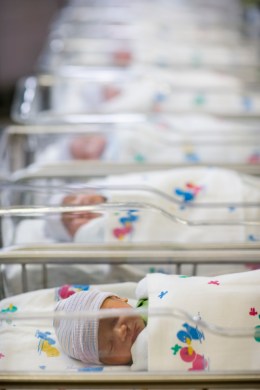
Your chances of being audited by the IRS are one in 175. Your chances of becoming president of the U.S. are one in 10,000,000. Your chances of winning the Megabucks Slot Machine Jackpot are one in 50 million. Your chances of giving birth to two sets of identical twins at once?
Seventy million to one, which is right up there with, well…someone has to win the lottery, right?
(MORE: California Highway Dig Yields New Whale Species)
A woman in Houston, Texas has four baby boys to crow about, which for just about any parent would be an event unto itself. But now 36-year-old Tressa Montalvo can add “had two sets of identical twins” to her bucket list.
Montalvo and her husband, Manuel Montalvo, Jr., say they weren’t using fertility drugs, and that the planned pregnancy “just succeeded a little too much,” reports Reuters. At 10 weeks, doctors told her she was having two babies — twins — but then later discovered another pair of heartbeats, which eventually led to confirmation that the couple was going to have not only four babies but two sets of twins.
With double sets of twins, the mother carries two placentas; each set of twins shares one. Unsurprisingly, the babies were tiny when delivered by Caesarean section at 8:51 a.m. on Feb. 14 — between three and four pounds each.
The odds of having quadruplets are long enough — about one in 571,787, according to Mothers of Super Twins, a nonprofit organization that follows multiple births. (According to the Centers for Disease Control and Prevention, the U.S. saw just 313 quadruplet births in 2010). But the odds of having four identical quadruplets plummets to one in 13 million, and the odds against having two sets of identical twins are, like winning the lottery, astronomically small.
What do you do after you’ve had four boys? According to the Women’s Hospital of Texas, where the children were delivered, their father said the couple wants to try for a girl.
MORE: Thieves Pull Off $50 Million Diamond Heist at Brussels Airport






